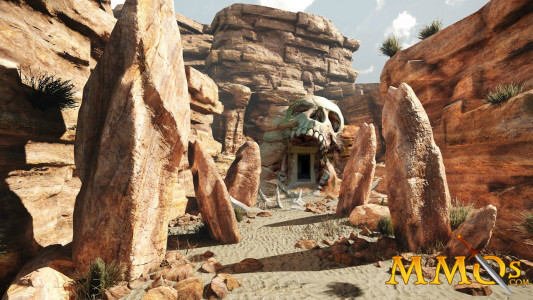The Role Hope Plays In Crowdfunding MMORPG Games

A new KickStarter game has been announced and it’s website highlights a bullet-point overview of every next-generation feature you want from an MMORPG: “a living world of consequence,” “dynamic dungeons,” “meaningful PvP.” The section labeled “key features” goes on, and on... and on. Each one that follows sends a new shiver of hype up your spine, until the final stretch goal glistens, and your teeter on the edge of climaxing into hopeful oblivion. “Yes. Yes! This is the MMORPG I’ve been waiting for.”
Sure it is. On paper.
When I was a kid my mother, like any maternal figure, filled my head with sayings and maxims, tidbits of advice to live by. The kind of phrases that sometimes pop up when you’re in an odd space and lend their hand. Some people call them sententious trivialities, but I’ve always considered aphorisms as the pinnacle of good life advice. And one of my favorites has always been, “actions speak louder than words.” It’s one thing to say something and another to live by it.
Why is it my favorite? Because it’s truth is self-evident. Look, it’s really easy to say whatever you want. Go ahead, try it, say, “I’m the Emperor of Ryzgyrzygstan.” Good job. How easy was that?—"So easy." You can say whatever you want and I fully support your right to do so. Declare yourself emperor, no problem. It’s all good, because I remember that just because you say something doesn’t mean it’s true. For one, the number of companies hiring an emperor has been on the decline since Napoleon; and two, Rygyrzgstan isn’t a country.
It's one thing to say something and another to live by it.
It’s one thing to write “a living world of consequence,” and another to implement a design which is imbued with the feature. If I sit here and reflect on the text between the last two quotes, epiphanies light up: I don’t know what “living world,” or “consequence” and the relationship between the two means—at least not practically. I certainly couldn’t draw a picture of it. Though I do have a general, abstract idea: an idealized vision of a final product but without any of the thorns that must be crossed to realize it.
Key features, and KickStarter bullet-points, are just words: empty and without reference on their own.
I see too many people forgetting that touted gameplay elements exists only for itself. It doesn’t reflect tangible product but a vision. I have a vision of world peace—I can surely define it—but no amount of money is going to help me motivate everyone to be a little kinder. No matter how much I hope, the universe is not going to shift in my favor. And when I see “living world with consequence,” I project my own ideas rather than understanding what that idea means in the developer’s head, because its a phrase as ambiguous as "justice."
Let's shift a bit.
Spinoza wrote his philosophy while wearing a ring with the word caute engraved; it’s Latin for “caution.” Every proposition, every action he took, was done so with skeptically-fueled caution. The modern gamer—particularly MMORPG players looking to indie studios—ought to adopt a similar tag: approach all crowdfunded pitches with caution. Don’t be swept away by the ever-alluring emotion called hope, which is exactly what touted features of a game play on.
“Hope” is the word that’s capitalized for the sake of quick conceptual sales, stuff like art rendering of a spaceship that sells for $1,500. We are all hopeful that our appetites will be satiated by an indie AAA MMORPG, that somehow a superstar development team—magnetized together by luck and vision and Kickstarter—are in the right seat at the right time, and will work together to deliver a phenomenal, unforgettable experience.
Unfortunately, virtual worlds aren’t built on hope.
Always remember, there is a marketing machine: something that stirs and slouches, grinds and gurgles, that’s given a biscuit every time it converts another believer. It exists to sell you something: a product, a idea, a promise. It doesn’t need to deal with reality exactly as it is. It only needs to promise a future, an idea that will be strived for, at least as far as the current moment is concerned. And to foster that hope, a game’s marketing has to sell it. Who would sell reality—with all the risks and challenges involved—against that perfect pitch hoisted by hope’s cranes?
Once you suck down hope’s kool-aid it’s near impossible to overturn your belief. The brain doesn’t handle mistakes well and rages against any notion to the contrary, hence the cargo cults that rally to protect development teams and their project. Those quick-fix believers often become the frontline of street-level marketing, because their own dreams are tied to the development of the project they support. They behave as if their ego is intimately tied to a perception fostered by the community at large, and become vehement in the face of dissent.
So, when I see someone ecstatically promoting a game that’s just begun development, or is about to start a crowdfunding campaign, I’m not surprised. Convincing others to join their mania is a way to a validate their convictions—and referral codes (the prospect of making money for supporting a game without a single drop of gameplay, at least for the player) helps galvanize promotion, hence why at least one soon-to-be crowdfunded game is making the media rounds.
Why did I write this?
Hope is an easily manipulated emotion (hence, its use as a tool in politics) and is an affection which is played upon particularly in the sphere of crowdfunded games. Each studio presents itself as a prophet delivering a message—their project is salvation—and while we often don’t know what their final game will look like, we tend to drown out fear by elevating our hopes and prospects. “This game is the one true religion.” But hope offers no guarantees, and real investors know this.
When a company like a startup needs funding they call up investors. People who wear a name tag that says they routinely support projects in the hope they’ll see a return. Unlike the average consumer, smart investors don’t part with their money after a single PowerPoint presentation. They do everything in their power to mitigate their hope: they research, check up on the team, scrutinize the vision, find holes and potential issues, study the past and present; they demand transparency if a company wants their money.
Of course, crowdfunded projects don’t need to persuade the Buffets of the world. They just need to convince people like you or me, and operate under the “take it or leave it” attitude, which is why they throw up ambiguous features as part of a vision. They know that the vast majority are swept away by a few lyrical phrases and a well-edited video.
Players need to be skeptical
Skepticism is a word that is too often confused with “cynicism,” “salt,” and the like. I consider it a self-fulfilling conspiracy that skeptical scrutiny has been lumped together with negatively perceived attitudes. Because skepticism—in the instances discussed here—means trusting nothing at face value: tearing apart a project, asking who is on this team, what experiences do they have, evaluating the prospects of fulfilling those goals and discovering exactly what is meant by each key feature bullet point.
Skepticism means quelling the hype, means realizing that memeing the word “hype” is an extension of hope.
I’m tired of the cycle: players lifted up by prospects, and let down by sordid reality; content creators who hop on a vision’s bandwagon because it’s what their audience wants—or maybe they’re just as guilty of face-value inquiry. I’m tired of seeing backers and players turned into extensions of a crowdfunded project's marketing tentacles, each a spokesman in their own right: as their numbers grow they feel secure, and build their own community where each hears exactly what they want to hear and dissent means exile.
We live in a hype culture. People hype up the next Star Wars product or Marvel movie or game with Nathan Fillion voicing a character, throw coal into the engine until the train hits a blown-up bridge, and then move onto the next hype express. Hype culture means opinions are sacrosanct, and critics of hype are dubbed “jaded” by the people who each form one gear in the ever expanding network. Hype dilutes reality, masks it behind an overcharged and emotional fan-base.
Hype means not thinking for yourself. It’s an emotion, a surge of excitement that sits in your brain like a fluid of giddy emoticons, telling you to amp up your hope. You buy your way into a relentless fanboy enthusiasm that fosters its own community: a giant support group built on passion for something that has yet to exist, and then quickly wanes and dies like a desert flower when the vision becomes the reality.
I think we’re more addicted to the hope inherent in hype than the end result.
If you really don’t care, and just like to gamble with your money, that’s fine. If you have it, go for it. I hope you understand the Risks and Challenges involved, not the copy and pasted explanation thrown at the bottom of the Kickstarter. Know, you’re not supporting a game, not yet.
When I see people messaging us, “Yooo MMOs.com, did you hear about this new game!? It’s heading to Kickstarter, mannn it looks so fregging sweet.” Sorry dude. It’s not the game that looks sweet, it’s the vision. It’s the hope.
The future always look better in dreams.
This article is a follow-up to yesterday's satirical post, which on one level—at least—holds the same ideas: Kickstarter MMORPG: All Aboard Hype Train To La La Land.







